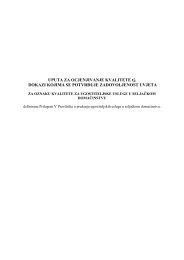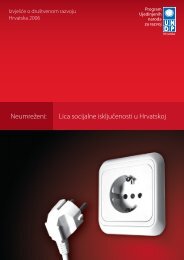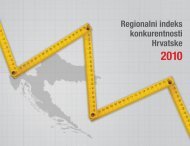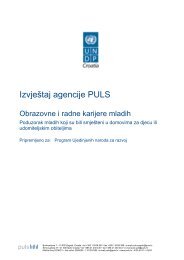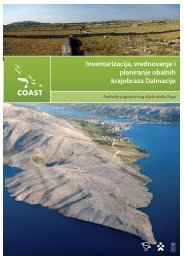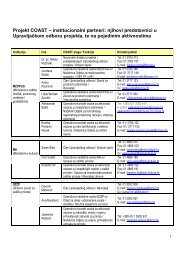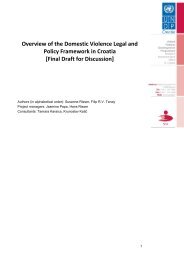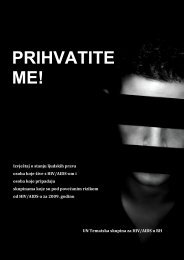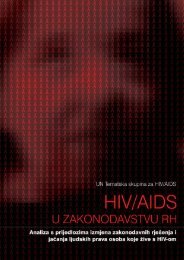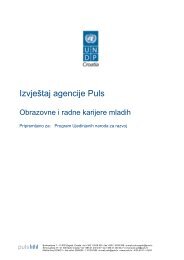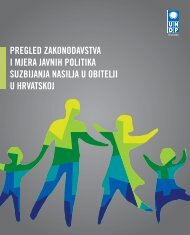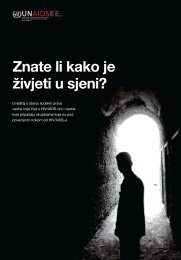WEB engleska verzija end.indd - UNDP Croatia
WEB engleska verzija end.indd - UNDP Croatia
WEB engleska verzija end.indd - UNDP Croatia
- No tags were found...
You also want an ePaper? Increase the reach of your titles
YUMPU automatically turns print PDFs into web optimized ePapers that Google loves.
CHAPTER 3THE SOCIALLY EXCLUDED- A lack of professionalism by public employeeswho contact members of the affected family inan untimely, unprofessional and inexpert manner.They feel that there is no compassion towards thewoman suffering from domestic violence; theirtestimonies are met with suspicion and scepticism.- Insistence on “conciliation” procedures oftenjeopardise the safety of the woman. According tothe Family Act, in divorce proceedings spouseswho have under-age children must participate ina conciliation procedure at a social welfare centre.Having att<strong>end</strong>ed three to six conciliatory meetings,a centre for social welfare then decides, within aperiod of six months, whether or not the procedurewas successful.- The marriage and family teams (consisting of a socialworker, a psychologist and a jurist) are burdenedwith too heavy a caseload and, consequently,become insensitive. There have also been reportsof powerlessness on the side of these teams whichmay have been intimidated or threatened by theaccused.- Until the adoption of the new Family Act, the socialwelfare centre was responsible for the removal ofsmall children, with support from the local police.If the centre met with resistance from the accused,they would seek a court order authorizing theaction. However, the matter would only be heardin court after a certain number of unsuccessfulenforcements (attempted every one to threemonths), prolonging the harmful consequences ofthe situation for both the children and the victims.3.10.3 Access to HealthcareAccording to the Act on Protection against FamilyViolence: “Healthcare workers, social welfare workers,psychologists, social workers, social pedagogues andworkers in educational institutions must report anycases of family violence to the police or the municipalstate attorney’s office...” 131 There is no legislation dedicatedto the medical and psychological support ofvictims of domestic violence however in the Protocolon Handling Cases of Family Violence it is stated thatthe Ministry of Health and Social Welfare should issuerecomm<strong>end</strong>ations to healthcare workers regardingvictims of domestic violence. The health of womenwho have had to <strong>end</strong>ure long-term violence is oftenweakened, and many take sedatives prescribed byspecialists, instead of receiving concrete assistance ingetting out of the abusive situation. Women who arethe victims of violence are often afraid or ashamed tosee a doctor for help, so their health keeps deteriorating.Women who are the victims of violence have topay 120 HRK for the case history with a detailed list ofinjuries, which they need as evidence in court.3.10.4 Access to Employment andEmployment ServicesAccording to the <strong>UNDP</strong> study, 132 women feel discriminatedagainst in terms of employment and career advancementmore frequently than men. Women are alsoone of the most vulnerable groups (especially singlemothers) threatened by poverty - there are more unemployedwomen than men, and more women workin lower paid jobs. 133 For women who are the victims ofdomestic violence, finding access to rewarding employmentis that much more difficult, because violent mencontrol their partners in all spheres of life, frequentlykeeping them in complete social isolation. If womenare employed, their employment is not necessarilyterminated when they go to the shelter. Women whohave not been employed can find employment duringtheir stay in shelter, although some stay completelyoutside the labour market, worsening their situation,as they are unable to gain economic indep<strong>end</strong>ence.Women who are exposed to violence are often absentfrom work due to their physical injuries and/or correspondingpsychological problems. There are very few,if any, social programmes that deal with the economicempowerment of women who are victims of violence.In 2005, the Women’s Entrepreneurial Centre Rosa wasone of the first to initiate a programme for the employmentof women who are victims of domestic violencein Velika Gorica. The programme was envisaged tohave two segments:131 Act on Protection against Family Violence, Article 5, OG 116/2003.132 <strong>UNDP</strong> (2006a). Research on social exclusion in <strong>Croatia</strong>: Quality of Life and the risk of social exclusion. <strong>UNDP</strong>, Zagreb, <strong>Croatia</strong>96133 Almost half (47.8%) of employed women work in 4 under-appreciated and underpaid sectors (textile industry, education, health care,social work); 6% of women are on high-ranking management positions; the average net salary for women in <strong>Croatia</strong> in 2003 was by 11.5%lower than for men; the greatest difference in salaries (22%) is present in trade and craft enterprises.



